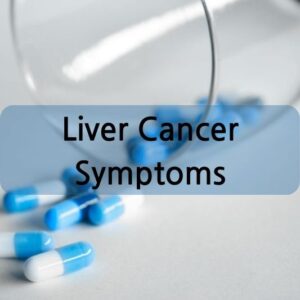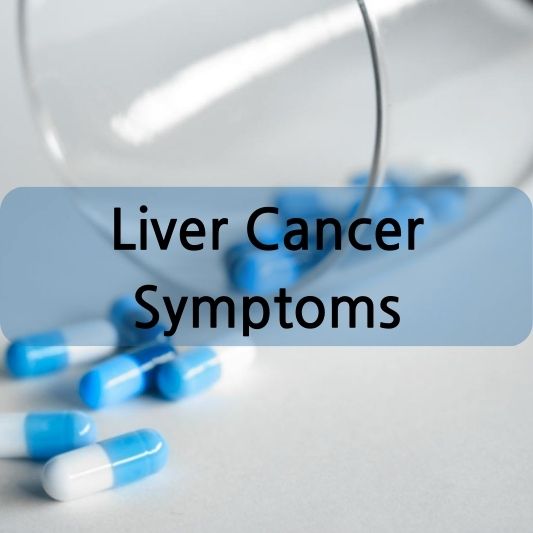Liver cancer, a formidable adversary, often progresses silently, making early detection crucial. This article aims to shed light on the symptoms of liver cancer, emphasizing the significance of recognizing signs promptly for effective intervention.

Introduction
Liver cancer, also known as hepatic cancer, is a serious condition that demands attention due to its often asymptomatic nature in the early stages. Understanding the symptoms and risk factors is vital for timely diagnosis and treatment. Let’s delve into the world of liver cancer and explore its symptoms, diagnostic methods, treatment options, and more.
Understanding Liver Cancer
Definition and Types of Liver Cancer
Liver cancer originates in the liver cells and can manifest in different forms. Primary liver cancer includes hepatocellular carcinoma (HCC), intrahepatic cholangiocarcinoma, and angiosarcoma. It’s crucial to distinguish these types for accurate diagnosis and tailored treatment plans.
Causes and Risk Factors
Various factors contribute to the development of liver cancer, including chronic hepatitis infections, cirrhosis, excessive alcohol consumption, and exposure to aflatoxins. Understanding these risk factors enables individuals to take proactive steps towards prevention.
Common Liver Cancer Symptoms
Unexplained Weight Loss
One of the early signs of liver cancer is unexplained weight loss. As the cancer progresses, the body may experience metabolic changes leading to weight loss, often noticeable in a short period.
Abdominal Pain and Swelling
Liver cancer can cause abdominal discomfort and swelling. As the tumor grows, it exerts pressure on surrounding organs, resulting in pain and distension. Recognizing these symptoms early can facilitate timely medical intervention.
Jaundice
Jaundice, characterized by yellowing of the skin and eyes, is a significant indicator of liver dysfunction. Liver cancer can obstruct bile ducts, leading to the accumulation of bilirubin in the bloodstream, causing jaundice.
Fatigue and Weakness
The progression of liver cancer can lead to fatigue and weakness. Understanding the connection between these symptoms and liver health is crucial for early detection and management.
Diagnostic Methods
Imaging Tests
Non-invasive imaging tests like CT scans, MRIs, and ultrasounds play a crucial role in diagnosing liver cancer. These tests provide detailed images of the liver, helping healthcare professionals assess the size and location of tumors.
Blood Tests
Blood tests, including liver function tests and tumor marker tests, can reveal abnormalities indicative of liver cancer. Regular monitoring of these markers aids in early detection and monitoring of treatment effectiveness.
Biopsy
A biopsy involves the extraction of a small tissue sample for examination under a microscope. This definitive diagnostic method helps confirm the presence of cancer and determine its type, guiding the formulation of an appropriate treatment plan.
Treatment Options
Surgery
Surgical interventions, such as tumor resection or liver transplantation, are viable options for localized liver cancer. Surgical approaches aim to remove cancerous tissues while preserving healthy liver function.
Chemotherapy
Chemotherapy involves the use of drugs to kill or slow the growth of cancer cells. While systemic, it can be an effective treatment, especially in cases where surgery is not feasible.
Targeted Therapy
Targeted therapies focus on specific molecules involved in cancer growth. These therapies can be more precise, minimizing damage to healthy cells and potentially enhancing treatment outcomes.
Immunotherapy
Immunotherapy harnesses the body’s immune system to target and eliminate cancer cells. This innovative approach shows promise in improving survival rates and reducing the risk of recurrence.
Coping with Liver Cancer
Supportive Care
Patients undergoing liver cancer treatment often require supportive care to manage side effects and maintain overall well-being. Palliative care plays a crucial role in enhancing the quality of life during and after treatment.
Lifestyle Changes
Adopting a healthy lifestyle is paramount for individuals with or at risk of liver cancer. This includes maintaining a balanced diet, engaging in regular physical activity, and avoiding known risk factors.
Emotional Well-being
Coping with liver cancer goes beyond physical aspects. Addressing emotional well-being through counseling and support groups can provide individuals and their families with valuable tools to navigate the challenges ahead.
Prevention and Risk Reduction
Healthy Lifestyle Choices
Making informed lifestyle choices, such as limiting alcohol consumption, maintaining a healthy weight, and avoiding risky behaviors, can significantly reduce the risk of developing liver cancer.
Vaccination Against Hepatitis B
Since chronic hepatitis B infection is a major risk factor for liver cancer, getting vaccinated is a proactive step in preventing both hepatitis B and its associated complications.
Prognosis and Survival Rates
Stages of Liver Cancer
Liver cancer is staged based on the extent of tumor growth and its spread. Understanding the stages is crucial for determining prognosis and developing an effective treatment plan.
Factors Influencing Prognosis
Several factors, including the stage of cancer, overall health, and response to treatment, influence the prognosis of liver cancer. Early detection and intervention can positively impact these prognostic factors.
Importance of Regular Check-ups
Early Detection Saves Lives
Regular health check-ups and screenings are instrumental in detecting liver cancer in its early stages. Early intervention significantly improves the chances of successful treatment and long-term survival.
Routine Screenings for At-risk Individuals
Individuals with risk factors, such as those with chronic liver diseases or a family history of liver cancer, should undergo routine screenings. This proactive approach enhances early detection and facilitates timely intervention.
Personal Stories of Triumph
Inspiring Stories of Liver Cancer Survivors
Highlighting personal stories of individuals who triumphed over liver cancer provides hope and inspiration. These stories underscore the importance of resilience and a positive mindset in the face of adversity.
The Importance of Hope
Emphasizing the role of hope in the journey of liver cancer empowers individuals to face challenges with determination. A positive outlook can contribute to better mental and physical well-being during treatment.
The Role of Nutrition
Diet Tips for Liver Health
Adopting a liver-friendly diet can support overall health and complement medical treatments. Incorporating nutrient-rich foods and avoiding those detrimental to liver function contribute to holistic well-being.
Foods to Include and Avoid
Guidelines on foods to include and avoid, tailored to liver health, provide practical insights for individuals navigating the nutritional aspects of liver cancer prevention and management.
Raising Awareness
The Need for Public Awareness Campaigns
Increasing awareness about liver cancer, its symptoms, and preventive measures is crucial for early detection and improved outcomes. Public awareness campaigns play a pivotal role in educating communities.
Encouraging Regular Health Check-ups
Promoting the importance of regular health check-ups encourages proactive healthcare seeking behavior. Early detection of liver cancer is a collective responsibility that begins with individual awareness.
Liver Cancer in Numbers
Statistics on Liver Cancer Prevalence
Examining global and regional statistics on liver cancer prevalence provides a comprehensive understanding of the impact of this disease. These numbers underscore the urgency of addressing liver cancer on a global scale.
Global Impact
Liver cancer’s global impact extends beyond individual cases. Understanding the broader implications emphasizes the need for collaborative efforts in research, prevention, and treatment.
Research and Innovations
Ongoing Studies and Breakthroughs
The field of liver cancer research is dynamic, with ongoing studies exploring new treatment modalities and breakthroughs. Staying informed about the latest advancements contributes to the collective effort in combating this disease.
Future Prospects for Liver Cancer Treatment
Anticipating future developments in liver cancer treatment fuels optimism. The ongoing pursuit of innovative therapies holds promise for improving survival rates and enhancing the quality of life for individuals affected by liver cancer.
Conclusion
In conclusion, recognizing liver cancer symptoms is paramount for early detection and effective treatment. This article has explored the diverse facets of liver cancer, from symptoms and diagnosis to treatment options and lifestyle considerations. Empowering individuals with knowledge and fostering a proactive approach to health can make a significant difference in the fight against liver cancer.
Frequently Asked Questions (FAQs)
Q: Can liver cancer be prevented entirely?
A: While complete prevention may not be guaranteed, adopting a healthy lifestyle and getting vaccinated against hepatitis B can significantly reduce the risk.
Q: What role does early detection play in the prognosis of liver cancer?
A: Early detection substantially improves the prognosis of liver cancer by enabling timely and effective treatment.
Q: Are there support groups for individuals and families affected by liver cancer?
A: Yes, various support groups and counseling services are available to help individuals and their families navigate the emotional challenges of living with liver cancer.
Q: Is liver cancer always symptomatic, or can it develop without noticeable signs?
A: Liver cancer can be asymptomatic in the early stages, making regular health check-ups and screenings crucial for early detection.
Q: How can I contribute to liver cancer awareness efforts in my community?
A: You can contribute by sharing information, participating in awareness events, and encouraging others to prioritize regular health check-ups.
Find out nutritional supplements to help your liver health on iHerb!
